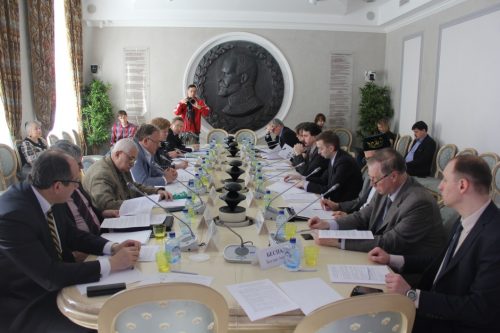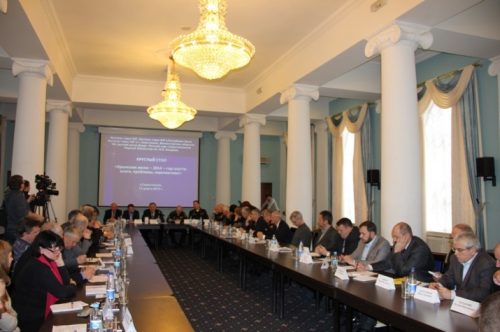



The Institute of CIS countries
 The Institute of CIS countries (Institute of Diaspora and integration) was created in June, 1996 in the form of independent noncommercial organization. Among the founders of the Institute are: Lomonosov Moscow State University, Moscow State Institute of International Relations of Russia MFA, institutes of Russian Academy of Sciences (Slavonic studies; ethnology and anthropology; Europe).
The Institute of CIS countries (Institute of Diaspora and integration) was created in June, 1996 in the form of independent noncommercial organization. Among the founders of the Institute are: Lomonosov Moscow State University, Moscow State Institute of International Relations of Russia MFA, institutes of Russian Academy of Sciences (Slavonic studies; ethnology and anthropology; Europe).
From the time of the Institute foundation its tasks are research of the former Soviet Union, scientific-analytical and socio-political assistance of the Russian Federation foreign-policy activities in the new abroad, and also diaspora policy of Russian Federation; forecasting of internal and external policy of former republics of the USSR; model development of economical, political, military and cultural integration in the former Soviet Union. The Institute puts a greater emphasis on collection and processing of the information about position of compatriots in the new abroad, strengthening of relationships with Russian Diaspora and emigrants living abroad. One of priority areas of activity of the Institute is monitoring of ethnic-social and political-military conflicts in the territory of former USSR, making recommendations for their resolution and prevention.
Until the present the Institute is the exclusive Russian scientific institution which provides comprehensive and integrated research of politico-social and economic processes in the former Soviet Union and problems of Russian compatriots.
Among primary users of information analysis reports, researches and forecasts of the Institute are: the State Duma and Federation Council of the Russian Federation, the Ministry of Foreign Affairs of the Russian Federation, Security Council of the Russian Federation, the Presidential Administration of the Russian Federation, the Ministry of Culture of the Russian Federation, the Ministry of Economic Development and Trade of the Russian Federation, research centers of the Russian Academy of Sciences, nonacademic national institutes, analytical centers, large business structures which have interests in the former Soviet Union.
Structure of the Institute completely reflects directions and specificity of its activities: the departments of Ukraine, Belorussia, Caucasus, Moldova and Transdniester, Central Asia and Kazakhstan, Diaspora and migration, Eurasian research and the Shanghai Cooperation Organization, department of connection with the Russian Orthodox Church and orthodox community abroad, Islamic research, Comparative legislation, Economic research. In the organization structure of the Institute of CIS countries functions Legal center, which give free legal assistance for compatriots who live abroad, and also for compatriots, who arrived in Russia for permanent residence and met with violation of their rights, who need consultation concerning the questions of legalization in the country and different life situations.
The Institute has branches and partner organizations in Erevan, Kiev, Sevastopol, Tiraspol; representative in Minsk. Including: The Ukrainian branch of The Institute of CIS countries in Kiev, The Institute of CIS countries in Sevastopol, The Institute of CIS countries in the Crimea, The Armenian branch of the Institute of CIS countries in Erevan, The branch of the Institute of CIS countries in Tiraspol.
During the years of its existence since 1996 The Institute of CIS countries held more than 180 conferences and round tables with the assistance of experts of international standards. Only in the last two years the Institute has organized 13 research and practice conferences (8 of which had international status). Including the conference in 2015: the International conference which was devoted to 70-years anniversary of Yalta conference, the research and practice conference “Crimean Spring in 2014. A year after. Results. Problems. Perspectives”, International research and practice conference “Eurasian vector of Russian-Kazakhstani cooperation: first results and perspectives” (Baikonur, Kazakhstan), International conference “The crime without time limitation – 100 years since Armenian genocide in the Ottoman Empire”, International conference “Russian-Chinese cooperation at the new stage” (together with Chinese institute of Russia, Eastern Europe and Central Asia). The Institute became the organizer of hearings in The Public Chamber of the Russian Federation “Whether we need the legal treatment of decision in 1954 about the transfer of Crimean territory from the Russian Soviet Federated Socialist Republic to the Ukrainian Soviet Socialist Republic” and “Activity of Rossotrudnichestvo and other Russian state and social structures for support of compatriots living abroad”.
In the Institute 53 employees work, among them are Doctors of Science and Doctors of Philosophy. The results of scientific and informational activities of the Institute are embodied in pages of periodic publications, which it issues: “Ukraine: information analysis monitoring”, “Moldova- transdniester region”,”Former-Soviet continent”, “Observer”, as well as on site Materik.ru.
* * *
 С момента основания Института в круг его задач входит изучение постсоветского пространства, научно-аналитическое и общественно-политическое сопровождение внешнеполитической деятельности Российской Федерации в ближнем зарубежье, а также российской диаспоральной политики; прогнозирование внутренней и внешней политики бывших союзных республик; разработка моделей экономической, политической, военной и культурной интеграции на постсоветском пространстве. Большое значение Институт уделяет сбору и обработке информации о положении соотечественников в ближнем зарубежье, укреплению связей с русской диаспорой и эмиграцией за рубежом. Одно из приоритетных направлений деятельности Института — мониторинг этно-социальных и военно-политических конфликтов на территории бывшего СССР, выработка рекомендаций по их разрешению и предотвращению.
С момента основания Института в круг его задач входит изучение постсоветского пространства, научно-аналитическое и общественно-политическое сопровождение внешнеполитической деятельности Российской Федерации в ближнем зарубежье, а также российской диаспоральной политики; прогнозирование внутренней и внешней политики бывших союзных республик; разработка моделей экономической, политической, военной и культурной интеграции на постсоветском пространстве. Большое значение Институт уделяет сбору и обработке информации о положении соотечественников в ближнем зарубежье, укреплению связей с русской диаспорой и эмиграцией за рубежом. Одно из приоритетных направлений деятельности Института — мониторинг этно-социальных и военно-политических конфликтов на территории бывшего СССР, выработка рекомендаций по их разрешению и предотвращению.
До сих пор Институт является единственным российским научным учреждением, обеспечивающим всестороннее и комплексное исследование социально-политических и экономических процессов на постсоветском пространстве и проблем российских соотечественников.
В число основных пользователей информационно-аналитических докладов, исследований и прогнозов Института входят: Государственная Дума и Совет Федерации РФ, МИД РФ, Совет безопасности РФ, Администрация Президента РФ, Министерство культуры РФ, Минэкономразвития РФ, исследовательские центры Российской академии наук, неакадемические государственные институты, аналитические центры, крупные бизнес-структуры, имеющие интересы на постсоветском пространстве.